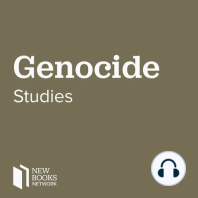59 min listen

Ümit Kurt, "The Armenians of Aintab: The Economics of Genocide in an Ottoman Province" (Harvard UP, 2021)
Ümit Kurt, "The Armenians of Aintab: The Economics of Genocide in an Ottoman Province" (Harvard UP, 2021)
ratings:
Length:
60 minutes
Released:
Nov 17, 2021
Format:
Podcast episode
Description
Ümit Kurt, born and raised in Gaziantep, Turkey, was astonished to learn that his hometown once had a large and active Armenian community. The Armenian presence in Aintab, the city’s name during the Ottoman period, had not only been destroyed―it had been replaced. To every appearance, Gaziantep was a typical Turkish city.
Kurt digs into the details of the Armenian dispossession that produced the homogeneously Turkish city in which he grew up. In particular, he examines the population that gained from ethnic cleansing. Records of land confiscation and population transfer demonstrate just how much new wealth became available when the prosperous Armenians―who were active in manufacturing, agricultural production, and trade―were ejected. Although the official rationale for the removal of the Armenians was that the group posed a threat of rebellion, Kurt shows that the prospect of material gain was a key motivator of support for the Armenian genocide among the local Muslim gentry and the Turkish public. Those who benefited most―provincial elites, wealthy landowners, state officials, and merchants who accumulated Armenian capital―in turn financed the nationalist movement that brought the modern Turkish republic into being. The economic elite of Aintab was thus reconstituted along both ethnic and political lines.
The Armenians of Aintab: The Economics of Genocide in an Ottoman Province (Harvard UP, 2021) draws on primary sources from Armenian, Ottoman, Turkish, British, and French archives, as well as memoirs, personal papers, oral accounts, and newly discovered property-liquidation records. Together they provide an invaluable account of genocide at ground level.
Renee Garfinkel, Ph.D. is a psychologist, writer, Middle East television commentator and host of The New Books Network’s Van Leer Jerusalem Series on Ideas. Write her at reneeg@vanleer.org.il
Learn more about your ad choices. Visit megaphone.fm/adchoices
Support our show by becoming a premium member! https://newbooksnetwork.supportingcast.fm/genocide-studies
Kurt digs into the details of the Armenian dispossession that produced the homogeneously Turkish city in which he grew up. In particular, he examines the population that gained from ethnic cleansing. Records of land confiscation and population transfer demonstrate just how much new wealth became available when the prosperous Armenians―who were active in manufacturing, agricultural production, and trade―were ejected. Although the official rationale for the removal of the Armenians was that the group posed a threat of rebellion, Kurt shows that the prospect of material gain was a key motivator of support for the Armenian genocide among the local Muslim gentry and the Turkish public. Those who benefited most―provincial elites, wealthy landowners, state officials, and merchants who accumulated Armenian capital―in turn financed the nationalist movement that brought the modern Turkish republic into being. The economic elite of Aintab was thus reconstituted along both ethnic and political lines.
The Armenians of Aintab: The Economics of Genocide in an Ottoman Province (Harvard UP, 2021) draws on primary sources from Armenian, Ottoman, Turkish, British, and French archives, as well as memoirs, personal papers, oral accounts, and newly discovered property-liquidation records. Together they provide an invaluable account of genocide at ground level.
Renee Garfinkel, Ph.D. is a psychologist, writer, Middle East television commentator and host of The New Books Network’s Van Leer Jerusalem Series on Ideas. Write her at reneeg@vanleer.org.il
Learn more about your ad choices. Visit megaphone.fm/adchoices
Support our show by becoming a premium member! https://newbooksnetwork.supportingcast.fm/genocide-studies
Released:
Nov 17, 2021
Format:
Podcast episode
Titles in the series (100)
Brendan C. Lindsay, “Murder State: California’s Native American Genocide, 1846-1873” (University of Nebraska Press, 2012): Brendan C. Lindsay‘s impressive if deeply troubling new book centers on two concepts long considered anathema: democracy and genocide. One is an ideal of self-government, the other history’s most unspeakable crime. Yet as Lindsay deftly describes, by New Books in Genocide Studies